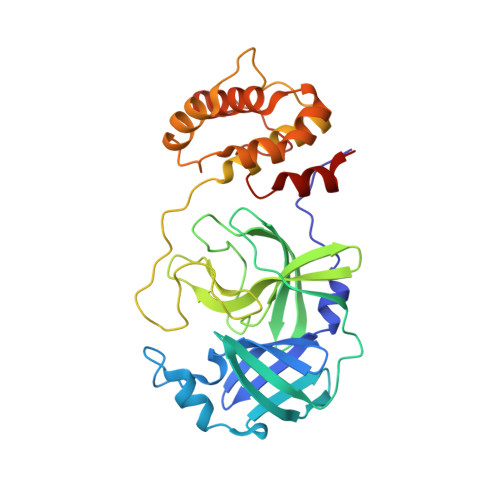An automatic pipeline for the design of irreversible derivatives identifies a potent SARS-CoV-2 M pro inhibitor.
Zaidman, D., Gehrtz, P., Filep, M., Fearon, D., Gabizon, R., Douangamath, A., Prilusky, J., Duberstein, S., Cohen, G., Owen, C.D., Resnick, E., Strain-Damerell, C., Lukacik, P., Barr, H., Walsh, M.A., von Delft, F., London, N.(2021) Cell Chem Biol 28: 1795-1806.e5
- PubMed: 34174194
- DOI: https://doi.org/10.1016/j.chembiol.2021.05.018
- Primary Citation of Related Structures:
7NW2 - PubMed Abstract:
Designing covalent inhibitors is increasingly important, although it remains challenging. Here, we present covalentizer, a computational pipeline for identifying irreversible inhibitors based on structures of targets with non-covalent binders. Through covalent docking of tailored focused libraries, we identify candidates that can bind covalently to a nearby cysteine while preserving the interactions of the original molecule. We found ∼11,000 cysteines proximal to a ligand across 8,386 complexes in the PDB. Of these, the protocol identified 1,553 structures with covalent predictions. In a prospective evaluation, five out of nine predicted covalent kinase inhibitors showed half-maximal inhibitory concentration (IC 50 ) values between 155 nM and 4.5 μM. Application against an existing SARS-CoV M pro reversible inhibitor led to an acrylamide inhibitor series with low micromolar IC 50 values against SARS-CoV-2 M pro . The docking was validated by 12 co-crystal structures. Together these examples hint at the vast number of covalent inhibitors accessible through our protocol.
Organizational Affiliation:
Department of Chemical and Structural Biology, Weizmann Institute of Science, 7610001 Rehovot, Israel.

















